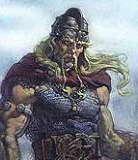- Posts: 9276
- Thank you received: 31
Pelosi to Bishops: Use Pulpit to Promote Immigration Reform
- The Viking
-

- Mountain Legend
-

PrestoChango wrote: Where was the outcry about separation of church and state when the religious right advocated the election of George W. Bush? Or when religious leaders regularly met with various presidents on both sides to counsel them on issues of concern
http://www.telegraph.co.uk/news/worldne ... efeat.html
I DON'T WANT SEPARATION OF CHRUCH AND STATE!! IT IS NOT IN THE CONSTITUTION! It is the left who are the hypocrites. They screeam bloody murder when it has to do with Christians or the Right, but they are fine when their party leader advocates it.
Please Log in or Create an account to join the conversation.
- outdoor338
-
 Topic Author
Topic Author
- Mountain Legend
-

- Posts: 3660
- Thank you received: 0
Please Log in or Create an account to join the conversation.
- Scruffy
-

- Mountain Legend
-

- Posts: 1401
- Thank you received: 0
The Viking wrote:
PrestoChango wrote: Where was the outcry about separation of church and state when the religious right advocated the election of George W. Bush? Or when religious leaders regularly met with various presidents on both sides to counsel them on issues of concern
http://www.telegraph.co.uk/news/worldne ... efeat.html
I DON'T WANT SEPARATION OF CHRUCH AND STATE!! IT IS NOT IN THE CONSTITUTION! It is the left who are the hypocrites. They screeam bloody murder when it has to do with Christians or the Right, but they are fine when their party leader advocates it.
Interesting, since that means you would not have a problems with Sharia law being implemented in America.
Please Log in or Create an account to join the conversation.
- LadyJazzer
-

- Mountain Legend
-

- Posts: 14880
- Thank you received: 27
Thomas Jefferson was a man of deep religious conviction — his conviction was that religion was a very personal matter, one which the government had no business getting involved in. He was vilified by his political opponents for his role in the passage of the 1786 Virginia Statute for Religious Freedom and for his criticism of such biblical events as the Great Flood and the theological age of the Earth. As president, he discontinued the practice started by his predecessors George Washington and John Adams of proclaiming days of fasting and thanksgiving. He was a staunch believer in the separation of church and state.
Jefferson wrote a letter to the Danbury Baptist Association in 1802 to answer a letter from them written in October 1801. A copy of the Danbury letter is available here. The Danbury Baptists were a religious minority in Connecticut, and they complained that in their state, the religious liberties they enjoyed were not seen as immutable rights, but as privileges granted by the legislature — as "favors granted." Jefferson's reply did not address their concerns about problems with state establishment of religion — only of establishment on the national level. The letter contains the phrase "wall of separation between church and state," which led to the short-hand for the Establishment Clause that we use today: "Separation of church and state."
The letter was the subject of intense scrutiny by Jefferson, and he consulted a couple of New England politicians to assure that his words would not offend while still conveying his message: it was not the place of the Congress or the Executive to do anything that might be misconstrued as the establishment of religion.
http://www.usconstitution.net/jeffwall.html
Please Log in or Create an account to join the conversation.
- LadyJazzer
-

- Mountain Legend
-

- Posts: 14880
- Thank you received: 27
Please Log in or Create an account to join the conversation.





